Last year, the High Court ruled that the Government could not give notice of ‘Brexit’ pursuant to article 50 of the Lisbon Treaty without the consent of Parliament. Within hours of the judgment, it was being reported that one of the applicants in the judicial review, Gina Miller, had been subjected to rape and death threats on social media. Cloaked in anonymity, some users of social media have seen this as an excuse to attack seemingly any woman who dares to speak up for what she believes in. Think of Caroline Criado-Perez and her innocuous campaign for the Bank of England to feature a woman on the new £10 note. Five days after appearing on News at Ten to celebrate the success of her campaign, Caroline was a news story herself after receiving vitriolic abuse on twitter. Unfortunately, although social media has increased the volume of abuse and speed with which it can be targeted, it would be naïve to think that such hatred towards female campaigners is anything new.
‘I should like the opportunity of starving & beating you to a pulp’. While you might think this was a tweet sent last week it is actually an exert from an anonymous (handwritten) letter sent to Emily Wilding Davison as she lay dying in Epsom Cottage Hospital in June 1913. Signed ‘An Englishman’ the letter starts, ‘I am glad to hear you are in hospital. I hope you suffer torture until you die. You Idiot’. Emily died on 8 June 1913, four days after she ran out in front of King George V’s horse at the Epsom Derby: an event that was captured on film and played around the world and which sealed her fate as one of the most fearless and courageous of all female campaigners.
Emily was one of four candidates in a competition, held last year, to name the new library, currently under construction, at Royal Holloway and Bedford New College, University of London. All of the candidates were alumnae of either Royal Holloway College or Bedford College and as an alumna, and current MA student, at Royal Holloway myself, I was eligible to vote.
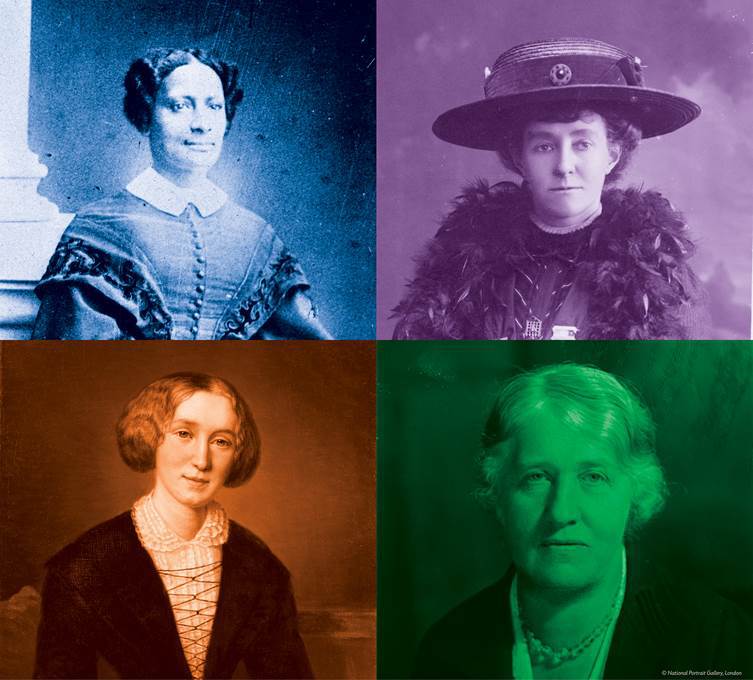
The four candidates from top left: Sarah Parker Remond, Emily Wilding Davison, Hilda Martindale and George Eliot (Mary Ann Evans) [Image: Royal Holloway #RHNameit]
Ironically, during their time as students at Royal Holloway College and Bedford College these women were denied the vote. It is as their champion, and a champion for all women, that I voted for Emily Wilding Davison, who campaigned fearlessly for women’s suffrage on equal terms with men. I appealed to Royal Holloway in these terms:
Deeds Not Words! Only by acting and naming the new Library and Student Services Centre after Emily Wilding Davison can RHUL prove a commitment to equal rights for men and women on the same terms – the cause for which Emily Wilding Davison fought and died and which still remains an issue more than 100 years later.
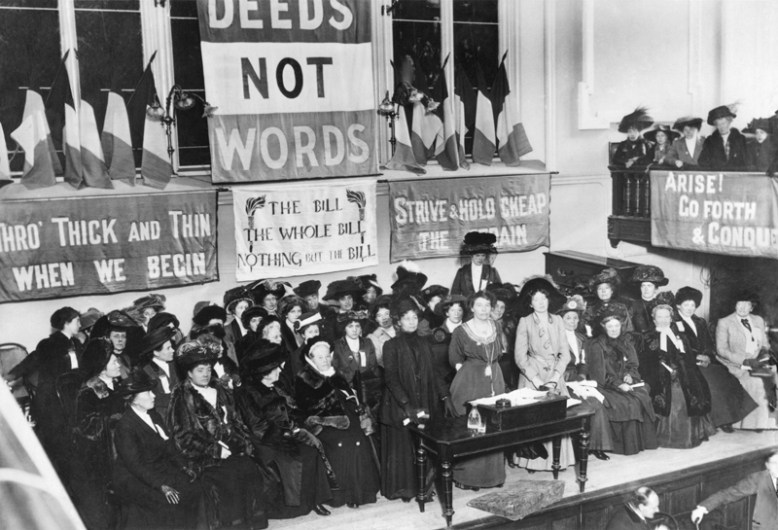
Suffragette meeting in Caxton Hall, Manchester in 1908 [Image: Wikimedia Commons]
‘Deeds Not Words’ was the motto of the Women’s Social and Political Union (WSPU) founded by Emmeline and Christabel Pankhurst in 1903. Emily Wilding Davison joined the WSPU and the militant campaign for women’s suffrage in 1906. Imprisoned eight times between 1909 and 1912, Emily went on hunger strike seven times and was force fed 49 times.
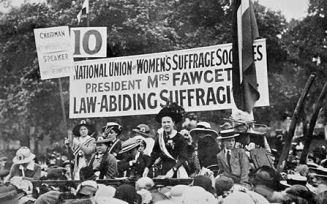
[Image: BBC]
The suffragettes, as distinct from the suffragists of the National Union of Women’s Suffrage Societies (NUWSS), faced criticism from those both in favour of and against women’s suffrage. Note the implicit criticism of the WSPU in the banner in this photograph which shows the NUWSS pilgrimage of law-abiding suffragists which ended in a gathering in Hyde Park on 26 July 1913, just two weeks after Emily’s death.
Following her death, the view of the suffragettes, in general, and Emily Wilding Davison, in particular, as ‘hysterical’ and ‘unbalanced’ was perpetuated by George Dangerfield’s The Strange Death of Liberal England first published in 1935 and reissued in 1995. There is no evidence to suggest that Emily was ‘unbalanced’. Responding to questioning during the inquest into his sister’s death, as reported in The Times on 11 June 1913, Captain Henry Davison answered that she was not ‘abnormal mentally’ and a verdict of death by misadventure was recorded. Unsubstantiated as it is, this suggestion that Emily was ‘unbalanced’ compares to criticism of today’s ‘raving’ feminists. In fact, Emily was a well-educated, much-loved daughter and sister who from Royal Holloway, via St Hugh’s College, Oxford, and the University of London, found herself in HMP Holloway where, in February 1912, she received a letter sending her ‘Oceans of love from Mother’.
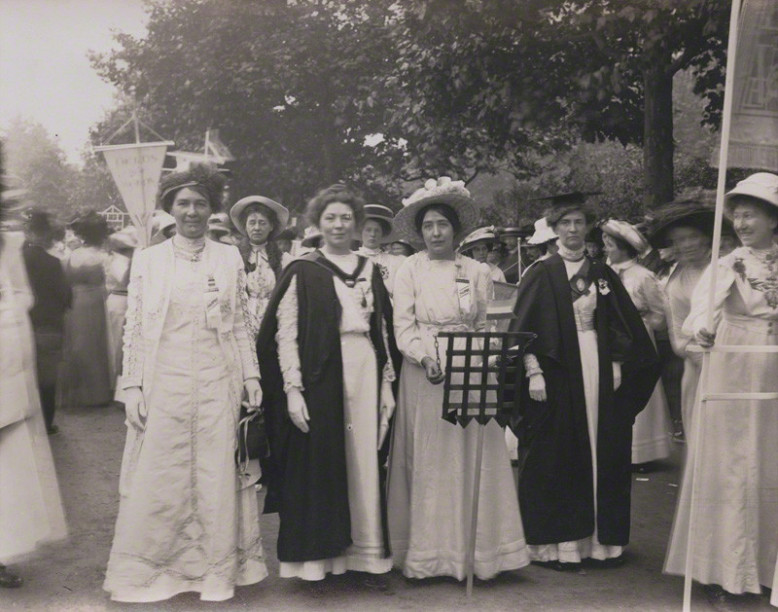
Emily (shown far right) on a suffragette march in Hyde Park on 23 July 1910 [Image: Copyright National Portrait Gallery, London]
Emily was well aware of the inequalities between men and women in Victorian and Edwardian Britain. In 1893, following the death of her father, she was forced to leave Royal Holloway when her mother could no longer afford the tuition. Shortly before her death, Emily wrote that ‘the true militant suffragette is an epitome of the determination of women to possess their own souls’. As a result, she was prepared to suffer, including, in the words of Christabel Pankhurst, the ‘barbarity’ and ‘blind, brute force’ of force feeding.
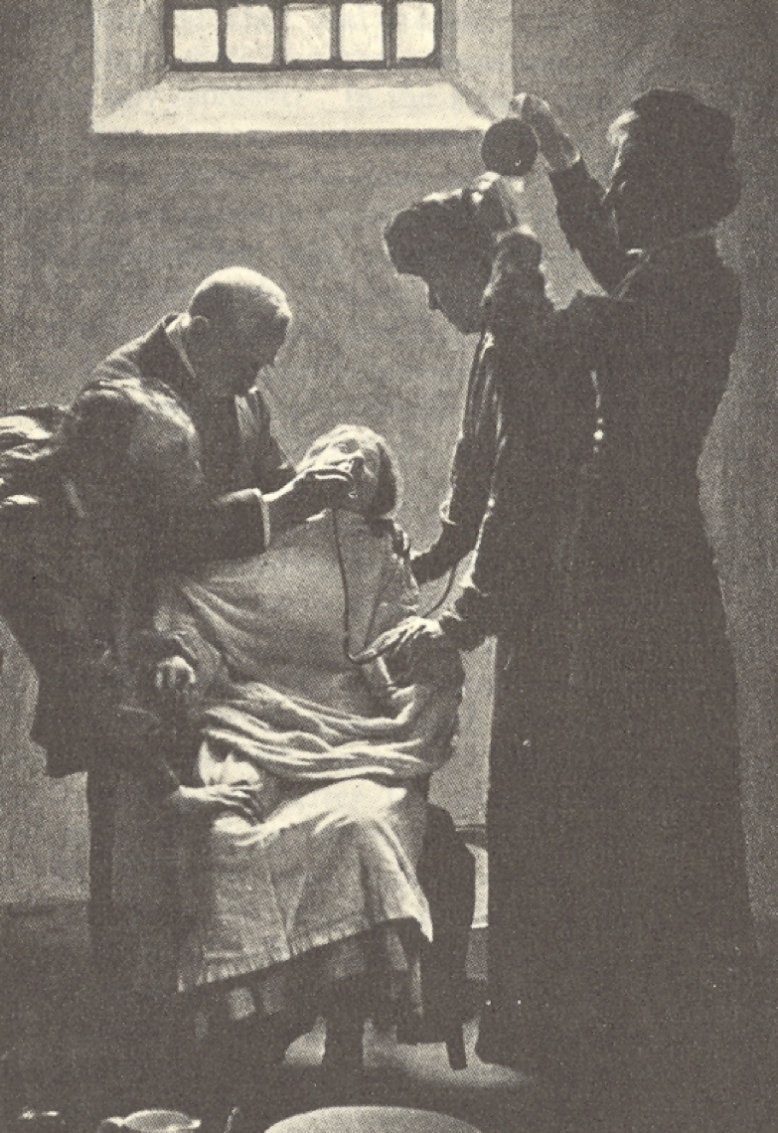
An image from The Suffragette magazine published by the WSPU showing the brutality of force feeding [Image: Wikimedia Commons]
Under the Representation of the People Act 1918 a limited number of women won the right to vote, a right which was extended to all women on the same terms as men by the Equal Franchise Act 1928. For the first time, although too late for Emily, women finally possessed their own souls. The approaching centenary of the passing of the Representation of the People Act is an ideal time for Royal Holloway to honour Emily Wilding Davison; to celebrate the contribution and sacrifice she made to the campaign for equal rights for women; and in so doing to counteract the attacks we so often otherwise see on female campaigners. It is also an opportune moment to remind people that the right to vote is precious and yet in the last general election over one-third of those eligible to vote didn’t. Turnout was slightly higher in the Referendum held in June but still nearly a quarter of eligible voters failed to vote. I hope to see the new Emily Wilding Davison Library to celebrate her courage, to encourage equality and to give courage to all women and men to have the strength to stand up for what they believe in and to vote.
Thank you to Katie Broomfield for her wonderful blog post, see more on Katie's blogsite History Heroines.